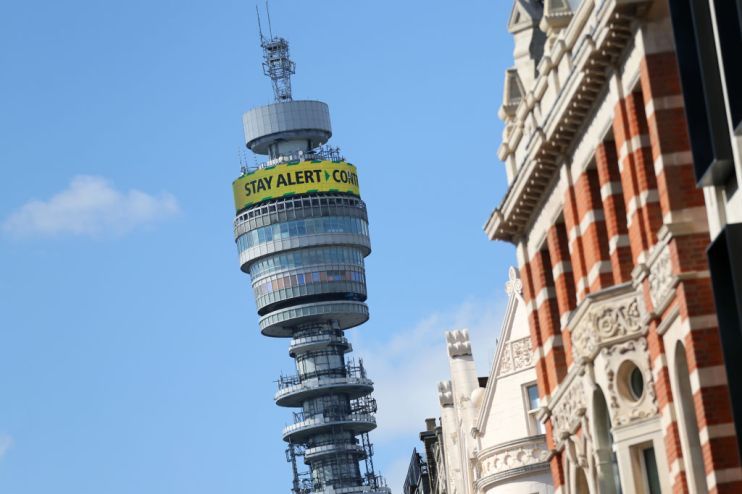BT blames coronavirus as profit and revenue shrink

Coronavirus blunted profit and revenue at BT in the three months of lockdown to the end of June, the UK telco said today.
The figures
Revenue shrank seven per cent to £5.24bn, primarily due to the economic fallout of coronavirus.
And profit before tax fell 13 per cent year on year to hit £561m as earnings suffered amid higher interest and depreciation costs.
Covid-19’s impact on earnings before interest, tax, depreciation and amortisation (Ebitda) saw free cashflow slump from £372m this time last year to minus £49m.
The group’s net debt pile swelled from £17.81bn last year to £18.18bn in the most recent quarter. BT said the hike was mainly driven by contributions to the firm’s pension scheme and capital expenditure.
Earlier this year BT withdrew its full-year profit guidance and suspended its dividend as the pandemic bit into its profits.
BT now says it expects full year revenue to slump between five and six per cent, as Covid-19 will continue to weigh on business for the foreseeable future.
Why it’s interesting
BT said the first quarter was “heavily impacted” by the pandemic, after cancelled sporting events drove a slump in revenue from residential customers and pubs.
Travel restrictions continued to eat into the firm’s roaming and pay-as-you-go revenue during the period, while BT said customers have been more “price-conscious” amid the pandemic.
The telecoms giant said Ebitda over the period sank due to lower revenues and continuing investment in the fairness commitments made to UK watchdog Ofcom.
BT said it will “continue to work with relevant authorities” over its use of Huawei technology after the government earlier this month demanded that all kit made by the Chinese vendor be stripped from UK 5G networks by 2027 over national security concerns.
“BT currently estimates that full compliance with these revised proposals would require additional activity, both in removing and replacing Huawei equipment from our existing mobile network, and in excluding Huawei from the 5G network that we
continue to build,” the firm said.
The telecoms titan maintained its ballpark figure of £500m to strip existing Huawei kit from its network.
Speaking to journalists this morning, chief executive Philip Jansen said: “Despite the logistical and cost implications, we believe the proposed 2027 end date provides sufficient scope to make these changes without impacting the resilience of our networks.”
“Whilst it’s not our natural replacement cycle. It gives us a chance to refresh the whole estate over the next seven years.”
BT also used the opportunity to announce its new Small Business Support Scheme (SBSS) to help firms boost connectivity, cash flow and confidence during the pandemic
The SBSS will see BT introduce a wave of measures to help Britain’s 5.8m small businesses recover from the coronavirus crisis, including helping firms fund the cost of business connections.
BT will also launch a new bursary scheme for 1000 UK tech startups from October, which will allow them to apply for free fibre broadband and mobile bundles.
BT said it expects to return the business to sustainable adjusted revenue growth, driven in part by the recovery from Covid-19.
What BT said
BT chief executive Philip Jansen said:
“Despite Covid-19, BT delivered a strong operating performance in the first quarter and delivered a relatively resilient set of financial results. We continue to invest in the long-term future of the business.
“Throughout this crisis we remain focussed on delivering against our strategic goals to deliver long-term value for shareholders.
“Together with continued improvements in customer experience and our modernisation programme, we are positively positioned for the future.
“Although uncertainties remain, we are now able to provide an outlook for this financial year. Despite our strong operational performance in the first three months of the year, it is clear that Covid-19 will continue to impact our business as the full economic consequences unfold.
“Beyond this year and based on current expectations, we expect to return the business to sustainable adjusted Ebitda growth, driven in part by the recovery from Covid-19.”